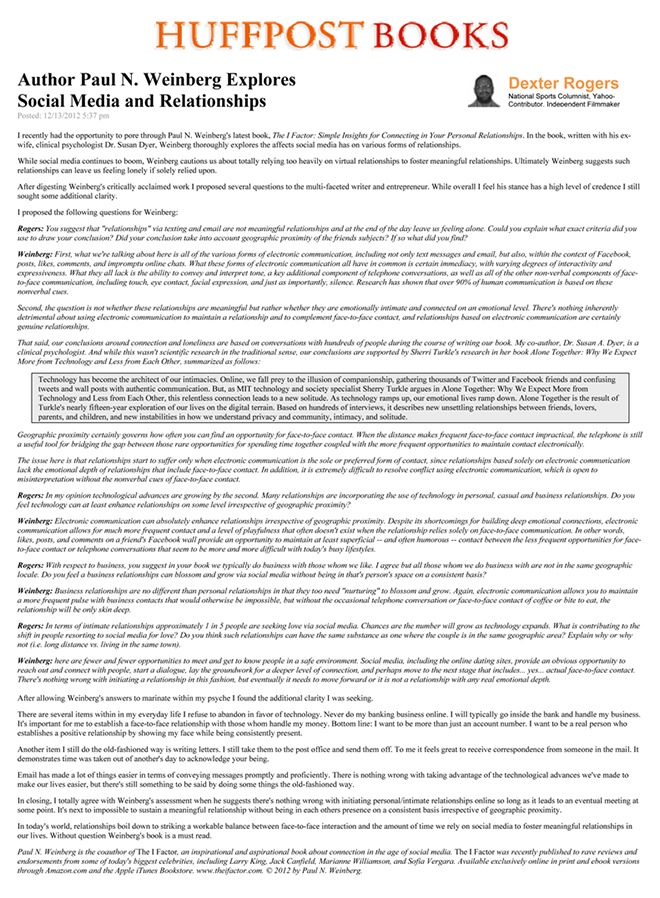The I Factor™
Simple Insights for Connecting in Your Personal Relationships
Huffington Post – Author Explores Social Media and Relationships
Posted on December 13, 2012 in Media Buzz | I recently had the opportunity to pore through Paul N. Weinberg’s latest book, The I Factor. In the book, written with his ex-wife, clinical psychologist Dr. Susan Dyer, Weinberg thoroughly explores the affects social media has on various forms of relationships.
I recently had the opportunity to pore through Paul N. Weinberg’s latest book, The I Factor. In the book, written with his ex-wife, clinical psychologist Dr. Susan Dyer, Weinberg thoroughly explores the affects social media has on various forms of relationships.
While social media continues to boom, Weinberg cautions us about totally relying too heavily on virtual relationships to foster meaningful relationships. Ultimately Weinberg suggests such relationships can leave us feeling lonely if solely relied upon.
After digesting Weinberg’s critically acclaimed work I proposed several questions to the multi-faceted writer and entrepreneur. While overall I feel his stance has a high level of credence I still sought some additional clarity.
I proposed the following questions for Weinberg:
Rogers: You suggest that “relationships” via texting and email are not meaningful relationships and at the end of the day leave us feeling alone. Could you explain what exact criteria did you use to draw your conclusion? Did your conclusion take into account geographic proximity of the friends subjects? If so what did you find?
Weinberg: First, what we’re talking about here is all of the various forms of electronic communication, including not only text messages and email, but also, within the context of Facebook, posts, likes, comments, and impromptu online chats. What these forms of electronic communication all have in common is certain immediacy, with varying degrees of interactivity and expressiveness. What they all lack is the ability to convey and interpret tone, a key additional component of telephone conversations, as well as all of the other non-verbal components of face-to-face communication, including touch, eye contact, facial expression, and just as importantly, silence. Research has shown that over 90% of human communication is based on these nonverbal cues.
Second, the question is not whether these relationships are meaningful but rather whether they are emotionally intimate and connected on an emotional level. There’s nothing inherently detrimental about using electronic communication to maintain a relationship and to complement face-to-face contact, and relationships based on electronic communication are certainly genuine relationships.
That said, our conclusions around connection and loneliness are based on conversations with hundreds of people during the course of writing our book. My co-author, Dr. Susan A. Dyer, is a clinical psychologist. And while this wasn’t scientific research in the traditional sense, our conclusions are supported by Sherri Turkle’s research in her book Alone Together: Why We Expect More from Technology and Less from Each Other, summarized as follows:
Geographic proximity certainly governs how often you can find an opportunity for face-to-face contact. When the distance makes frequent face-to-face contact impractical, the telephone is still a useful tool for bridging the gap between those rare opportunities for spending time together coupled with the more frequent opportunities to maintain contact electronically.
The issue here is that relationships start to suffer only when electronic communication is the sole or preferred form of contact, since relationships based solely on electronic communication lack the emotional depth of relationships that include face-to-face contact. In addition, it is extremely difficult to resolve conflict using electronic communication, which is open to misinterpretation without the nonverbal cues of face-to-face contact.
Rogers: In my opinion technological advances are growing by the second. Many relationships are incorporating the use of technology in personal, casual and business relationships. Do you feel technology can at least enhance relationships on some level irrespective of geographic proximity?
Weinberg: Electronic communication can absolutely enhance relationships irrespective of geographic proximity. Despite its shortcomings for building deep emotional connections, electronic communication allows for much more frequent contact and a level of playfulness that often doesn’t exist when the relationship relies solely on face-to-face communication. In other words, likes, posts, and comments on a friend’s Facebook wall provide an opportunity to maintain at least superficial — and often humorous — contact between the less frequent opportunities for face-to-face contact or telephone conversations that seem to be more and more difficult with today’s busy lifestyles.
Rogers: With respect to business, you suggest in your book we typically do business with those whom we like. I agree but all those whom we do business with are not in the same geographic locale. Do you feel a business relationships can blossom and grow via social media without being in that’s person’s space on a consistent basis?
Weinberg: Business relationships are no different than personal relationships in that they too need “nurturing” to blossom and grow. Again, electronic communication allows you to maintain a more frequent pulse with business contacts that would otherwise be impossible, but without the occasional telephone conversation or face-to-face contact of coffee or bite to eat, the relationship will be only skin deep.
Rogers: In terms of intimate relationships approximately 1 in 5 people are seeking love via social media. Chances are the number will grow as technology expands. What is contributing to the shift in people resorting to social media for love? Do you think such relationships can have the same substance as one where the couple is in the same geographic area? Explain why or why not (i.e. long distance vs. living in the same town).
Weinberg: here are fewer and fewer opportunities to meet and get to know people in a safe environment. Social media, including the online dating sites, provide an obvious opportunity to reach out and connect with people, start a dialogue, lay the groundwork for a deeper level of connection, and perhaps move to the next stage that includes… yes… actual face-to-face contact. There’s nothing wrong with initiating a relationship in this fashion, but eventually it needs to move forward or it is not a relationship with any real emotional depth.
After allowing Weinberg’s answers to marinate within my psyche I found the additional clarity I was seeking.
There are several items within in my everyday life I refuse to abandon in favor of technology. Never do my banking business online. I will typically go inside the bank and handle my business. It’s important for me to establish a face-to-face relationship with those whom handle my money. Bottom line: I want to be more than just an account number. I want to be a real person who establishes a positive relationship by showing my face while being consistently present.
Another item I still do the old-fashioned way is writing letters. I still take them to the post office and send them off. To me it feels great to receive correspondence from someone in the mail. It demonstrates time was taken out of another’s day to acknowledge your being.
Email has made a lot of things easier in terms of conveying messages promptly and proficiently. There is nothing wrong with taking advantage of the technological advances we’ve made to make our lives easier, but there’s still something to be said by doing some things the old-fashioned way.
In closing, I totally agree with Weinberg’s assessment when he suggests there’s nothing wrong with initiating personal/intimate relationships online so long as it leads to an eventual meeting at some point. It’s next to impossible to sustain a meaningful relationship without being in each others presence on a consistent basis irrespective of geographic proximity.
In today’s world, relationships boil down to striking a workable balance between face-to-face interaction and the amount of time we rely on social media to foster meaningful relationships in our lives. Without question Weinberg’s book is a must read.

The Authors
Media Buzz
Reader Reviews
- Everybody has hopes and challenges when it comes to relationships and intimacy. This book is a great guide for everyone and anyone...





